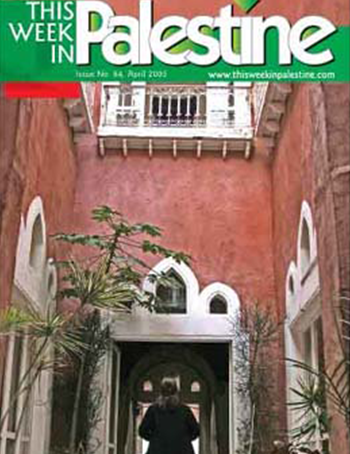
HAARETZ
'Lanterns' light up Ramallah
RAMALLAH - What does a childhood without music look like? What does the world look like for children who do not learn to listen to music at school, or to play an instrument or sing in a choir, and few of whom will be able to express themselves through music as adults? In such a world, even concepts like "concert," "opera" and "musical" remain unknown to children who have never even sat in front of a stage and applauded performers. And the thought of appearing on stage themselves, to act and to sing on it for an audience, to play music and even to win applause themselves never even occurs to them; the possibility of studying in a music track in high school or at an arts academy and developing a musical career belongs only to the realm of the imagination.
The lack of musical hope sounds rather trivial relative to the other grave problems from which a million Palestinian children in the West Bank and the Gaza Strip are suffering. However, anyone who recognizes the value of a musical education knows what meaning and richness it can grant. Out of this recognition of the virtues of music and its importance to children and to society, about a decade ago a Palestinian conservatory was established. The National Conservatory has its headquarters in East Jerusalem and two branches - one in Ramallah and another in Bethlehem. There, 440 students learn to play musical instruments.
Three years ago it was decided that this was not sufficient and that the children also need to perform. A meeting of a number of Palestinian artists engendered the idea of putting on a large-scale, original, uncompromisingly professional musical production that would give an opportunity to scores of children to perform, and to thousands of people to see it. This is the story of the birth of "Fawanees" ("Lanterns") - the first Palestinian musical.
Dalia Habash, the acting producer of "Fawanees," held in her somewhat trembling hands the few tickets that remained before the performance last Sunday. In view of the buses that were stopping at the entrance to the Ramallah Cultural Palace, bringing hundreds of children from the Ramallah and Bethlehem areas, every such ticket, which cost NIS 10, seemed to her like gold. A little while before the curtain rose, she parted with the last two.
The hall itself was already full. All of Ramallah knows about "Fawanees," and it would appear that many of the inhabitants of the West Bank know about it, too. Despite the size of the auditorium, with more than 700 seats, seven performances will not suffice for the thousands of people who are flocking to the musical. The three final shows will be held today and tomorrow at 5 P.M. and on Sunday at 1 P.M., in a performance to which children from the area of Jenin and Nablus are slated to come.
The excitement in the building was palpable, even in the lobby. Ushers greeted the people who came with a smile and directed them first to the counter, where they were asked to deposit mobile phones. Unlike in Israeli halls, here they are not interested in going through the ceremony of requesting "Please turn off your mobile phones" and then scowling at all the ringing that nevertheless slices through the hall, especially at the quietest moments.
The hall itself, Ramallah's "music sanctuary," was dedicated about two months ago in a large structure overlooking a wild, hilly landscape on the outskirts of the city. It has soft acoustics that are pleasant to the ear and beautiful proportions; it is equipped with comfortable seats and up-to-date sound and lighting systems, and even has a mobile recording studio and a special control panel for overseeing the electronics - like in sophisticated European halls.
An audience of all kinds of people filled the hall: secular and religious, men and women of all ages and especially children, who sat wide-eyed and impatient. Then the house lights went down and the sounds of the orchestra filled the space with the overture.
Bringing the sun
"Fawanees" is based on the children's book "Al-Qandeel Al-Saghir" by Ghassan Kanafani, a Palestinian writer and essayist who was born in Acre (1936), became a refugee in 1947 and wandered to Beirut, Damascus - where he studied Arabic literature at the university - and eventually to Kuwait. Kanafani was the first of the Palestinian political writers, and some of the many books and short stories that he wrote have been published in Hebrew as well: "The Return to Haifa," "The Land of the Sad Oranges" (which is included in a reader for high-school students), and the novellas "Men in the Sun" and "What Remains to Them" (which were published by the Mifras Publishing House). Two collections of his short stories and his novella "All That's Left to You," included in a volume with a selection of his short stories, are available in English. Kanafani wrote his first children's book as a birthday gift for his niece Lamis and illustrated it himself.
Kanafani's membership in George Habash's Popular Front for the Liberation of Palestine - he was the organization's spokesman and edited its organ Al-Hadaf - made him a target for assassination by Israel. In 1972, he was riding in a car with a niece in the streets of Beirut and the assassins struck: The car was blown up and both of them were killed.
"The Little Lantern" has been adapted by Wasin Kurdi, a poet who lives in Ramallah, into a musical of 28 songs (for chorus, duets and soloists). The play - which was performed 12 years ago in Jenin and has been documented in Juliano Mer's film "Arna's Children" - tells the story of a king who is about to die, who commands his daughter the princess to bring the sun to his palace, otherwise she will not be able to be queen and lead the kingdom. After his death, the daughter tries to fulfill his request, but fails and despairs. One day an old man carrying a lantern comes to the palace gates. The daughter refuses to let him in: "How will you succeed in bringing the sun itself here if you don't even allow an old man carrying a lantern to come in?" he asks, and then disappears.
The princess realizes that she has been given a hint and tries to find the magical man, but in vain. She therefore commands all the lantern-bearers in the kingdom to come to the palace. Thousands of them flock to the narrow opening in the wall but do not manage to crowd in. The princess commands: "Destroy the palace wall!" Everyone enters with the collapse of the wall; with it are destroyed the inner walls that the princess had erected around herself. The light of the lanterns that the people are carrying grows as strong as the light of the sun, and her father's legacy is fulfilled. And as for the ruins of the walls - they serve for the construction of schools and hospitals, for the welfare of the inhabitants.
International crew
To the sounds of the music, the curtain went up in Ramallah and revealed a sophisticated stage set by Majed Zbeidi of Ramallah, who created semi-transparent screens and a place for the orchestra. The children filled the stage: In splendid costumes designed by Mohammad Atallah, with "Madonna" microphones close to their mouths, they sang choral numbers, duets and solos - all the while acting and moving about, and using props like flags and candle-lit lanterns that flickered in the dark.
"I started to write the music two years ago," says Suhail Khoury, who composed the score for the musical, "and the musical result reflects my desire to mix a number of styles." And indeed, alongside music with a Western harmonic structure, in the spirit of popular musicals, it is possible to hear in "Fawanees" the colors of the music of the East, Swing and even one solo of traditional Arab music, performed in an Arab scale.
Khoury, who was born in East Jerusalem, began to study music when he was seven, and from a young age traveled from Jerusalem to Ramallah to study clarinet. He completed his higher education at the music school of the University of Iowa in classical music. Now he is turning more and more to Arab music: Among other things, he is a member of the Oriental Music Ensemble, for which he also composes. Yet, nevertheless, he admits that he loves musicals, "And I've also seen a lot of them - `Cats' and `Annie' and `Les Miserables' and `Evita' - way back since the end of the 1970s."
What attracted you to Kanafani's story?
Khoury: "The many meanings that it is possible to find in it, beyond the plot itself. Kanafani wrote his book more than 30 years ago, and even then he was relating to the Palestinian reality. Of course this is also reflected in the story today."
The crew of "Fawanees" come from all over the world: The orchestration is by Bishara Khell from Nazareth, the director is Fernanado Nope from Sweden, the lighting designer is Philippe Andrieux from France and the soundman is Issam Murad of East Jerusalem. And on the stage: more than 100 people, including a large chamber orchestra called The Young Sound Forum of Central Europe, which consists of string instruments, woodwinds, percussion, etc. The orchestra, conducted by Christophe Altstaedt, came from Germany and caused some missed heartbeats among the conservatory people: After officials at Ben-Gurion Airport discovered their destination, they forbade the players from entering Israel and ordered them to return. Only energetic intervention, bordering on panic, by embassies in Israel and in Germany rescued the musicians in the end, after five hours of real anxiety.
Happy, if muted, end
If there is something truly wonderful about "Fawanees," it is the level of singing that is demonstrated by the members of the Shams chorus. A year and a half of intensive work turned the 58 children - who are members of the choir and had never been on stage before, into skilled actors. They know how to exploit the stage space freely, to act and dance in coordination and to use a wealth of props. But all of this is overshadowed by their vocal and musical achievement. Their clean, clear singing, their ability to sing in two voices and the ease with which the children integrated into the nonstop, complex playing of the orchestra made it easy to mistake them for a veteran chorus. The soloists in the roles of the princess, the lantern-bearer and the captain of the guard were moving and wonderful.
The person who worked with the children and rehearsed them is the Palestinian choir director Hania Soudah-Sabbara. "The musical is the children's first vocal experience - we dived straight into the deep water," says Soudah-Sabbara. "Now I will be able to find the time to expand their horizons and develop their repertoire more"
She gathered the children from schools in Jerusalem, Ramallah and Bethlehem, and formed them into a chorus: "We succeeded in bringing them to rehearsals at the conservatory in Jerusalem, and we even organized an intensive 10-day musical camp. This is how it was completed. Five of the boys did lose their voices, which had changed - and this was really a tragedy - but of course I kept them on the stage."
"Fawanees" ends in a festive but muted manner. "I didn't want a bombastic finale," says Suhail Khoury, "and I had to defend this idea, because there were a lot of people who thought otherwise. I wanted only quiet and simplicity, so that people would be able to leave the theater and not just rejoice in the happy ending, but also ask themselves some questions."


